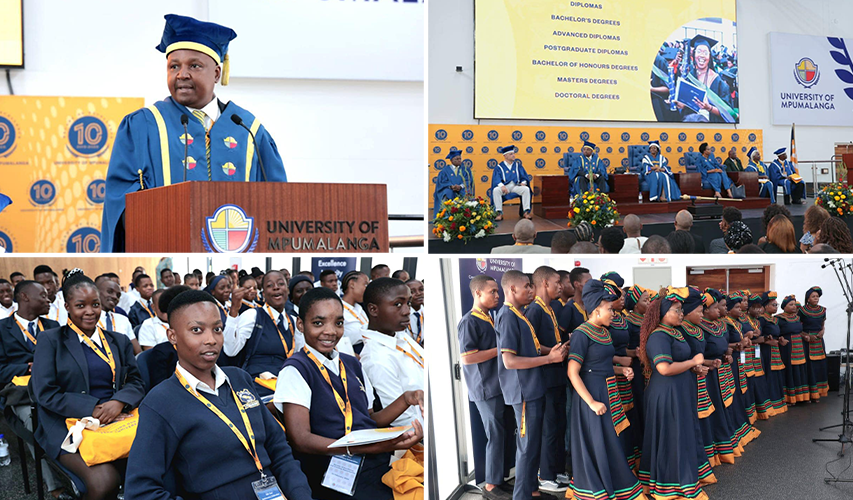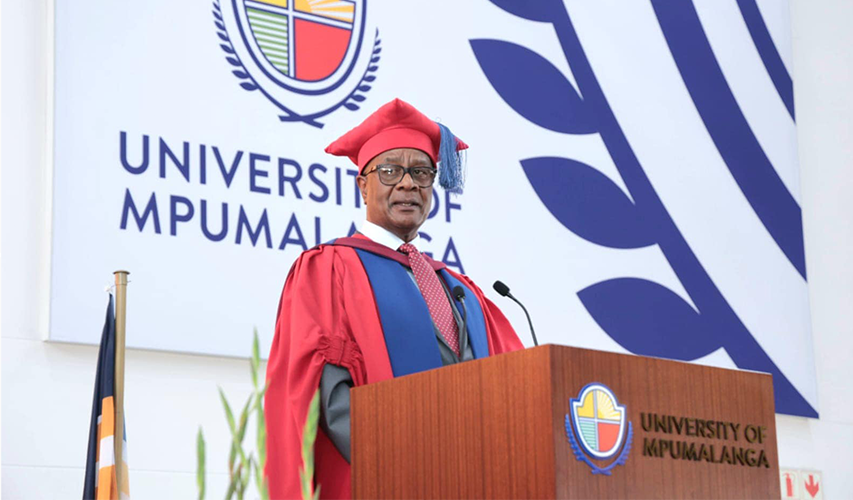The University of Mpumalanga (UMP) celebrated a decade of academic endeavours with a ceremony that honoured the first Chairperson of UMP Council, Prof David Mabunda, by conferring upon him the title of Professor Emeritus. Additionally, the Library and Information Services Building was named after the founding Vice-Chancellor of UMP, Prof Thoko Mayekiso.
Addressing the gathering, UMP Vice-Chancellor, Professor Thoko Mayekiso, paid tribute to the institutions and staff who contributed to the establishment of UMP and embarked on its pioneering journey.
Universities, as centres of learning, inherently reflect their societies and play a pivotal role in identifying the social and economic developmental challenges and opportunities within them, remarked Professor Mayekiso. She emphasised the distinct character and orientation of universities, shaped by various factors including size, shape, and differentiation, which inform their developmental trajectories.
 The 10-year Academic Activities celebration was attended by the UMP Community and external stakeholders.
The 10-year Academic Activities celebration was attended by the UMP Community and external stakeholders.
"We are dedicated to providing our students with transformative experiences through high-calibre curricula and co-curricular programmes that uphold principles of excellence, free inquiry, and academic integrity," Professor Mayekiso affirmed. "Our commitment to access for success underpins a supportive learning environment, facilitated through initiatives such as mentorship, peer assistance, and tutoring."
"From its inception, the University of Mpumalanga has been resolute in its aspiration to be an authentic African University, one that not only exists geographically within Africa but also recognises, affirms, and embeds the African experience and context in its academic endeavours," asserted Professor Mayekiso.
She further elucidated that UMP's academic project encompasses both the generation and dissemination of knowledge and skills, as well as the cultivation of students as independent and critical thinkers with a zeal for knowledge and its practical application.
"Our educational philosophy, underpinning our teaching approach, prioritises theoretical grounding, pedagogical appropriateness, and sensitivity to diversity in all its manifestations within the educational milieu," stated Professor Mayekiso. She underscored the integration of teaching, learning, research, and engagement, alongside an emphasis on exposing students to various epistemologies, including the indigenous knowledge systems.
Aligned with this philosophy, UMP is committed to fostering the holistic development of students, enabling them to realise their potential across cognitive, social, aesthetic, physical, and personal dimensions, thereby nurturing democratic citizenship.
 A festive atmosphere permeated campus during the celebratory event.
A festive atmosphere permeated campus during the celebratory event.
Milestones
Since its inception on 19 February 2014, the University of Mpumalanga has carved an impressive path marked by notable milestones. Among these achievements stands the establishment of the Faculty of Agriculture and Natural Sciences in 2016, followed by the momentous occasion of its inaugural Graduation Ceremony in 2017.
"In 2016, the introduction of the Vice-Chancellor Scholarship Programme marked a pivotal moment, with 250 deserving scholars awarded comprehensive support covering tuition, accommodation, meals, learning materials, laptops, a monthly stipend, and access to a Personal and Leadership Development Programme, propelling them from undergraduate to postgraduate levels.
Subsequently, the university expanded its academic horizons with the establishment of the Faculty of Education in August 2019, followed by the Faculty of Economics, Development, and Business Sciences in 2021. The introduction of the university's first Master's degree in 2020 and its first Doctoral degree in 2022 underscore its commitment to academic excellence and advancement.
Furthermore, the Academic Talent Stewardship Programme, initiated in 2022, distinguishes itself by appointing outstanding Master’s students as Associate Lecturers, nurturing and harnessing the brightest minds within the institution. Together, these milestones reflect the University of Mpumalanga's unwavering dedication to fostering intellectual growth and scholarly distinction."
 Professor David Mabunda delivered the Dr Enos Mabuza Inaugural Lecture on Education.
Professor David Mabunda delivered the Dr Enos Mabuza Inaugural Lecture on Education.
Accomplishments
Professor Mayekiso noted that student enrolment had surged from 169 in 2014 to 9 456 in 2024 (registration ongoing). UMP has graduated 4 485 students, with 125 awarded Cum Laude, exhibiting attributes such as resourcefulness, responsiveness, responsibility, critical thinking, innovation, effective communication, ethical and social awareness, and adaptability. Academic offerings have expanded from 3 in 2014 to 72 in 2024, spanning from Higher Certificate to Doctoral Degree.
"In fostering collaboration, UMP has forged partnerships with 35 international universities, including 11 in Europe, 4 in North America, 2 in Australia, 9 in Asia, and 9 in Africa. Notably, UMP's research excellence has been acknowledged through accolades such as the National Research Foundation Excelleration Award in 2022 and the National Research Foundation CEO's Special Recognition Award."
She also highlighted UMP's achievement of an unqualified audit opinion from External Auditors for nine consecutive years since its inception in 2014. Additionally, 52% of academic staff hold doctoral degrees, and positive feedback has been received from employers and higher education institutions regarding UMP graduates' competencies.
"We take pride in the remarkable accomplishments of the University over the past decade and envisage continued success in the years ahead," Professor Mayekiso affirmed.
Former Chairperson of Council at UMP, Professor David Mabunda, delivered the annual inaugural Dr Enos Mabuza Lecture on Education. In his speech Professor Mabunda said, "We are having this conversation 25 years since his passing because he is a national hero whose legacy is still prevailing."
He further illuminated the historical narrative, emphasizing the importance of acknowledging the struggles and sacrifices of all individuals, especially those who perished due to societal injustices. Within this framework of remembrance and honour, Professor Mabunda's discourse unfolded, painting a vivid picture of Dr. Mabuza's remarkable contributions to society.
 The celebration was well attended by students, staff and stakeholders.
The celebration was well attended by students, staff and stakeholders.
Reflecting on Dr Mabuza's enduring legacy, Professor Mabunda highlighted his remarkable achievements, which reverberate through the annals of history. Among these stand the provision of essential services such as clean water and electricity to remote communities, infrastructure development projects that connected villages and towns, and pioneering educational initiatives that transformed the landscape of learning in the region.
"Dr Mabuza was inspired by the view that if you invest in quality education and training, you create opportunities for potential productivity with the hope of upward mobility, which translates to better opportunities, better jobs, income and a general improvement of the nation."
Professor Mabunda explained that Dr Mabuza's unwavering commitment to education was a catalyst for societal advancement, stating that the KaNgwane Public Service Commission established a Bursary Office that was tasked with the responsibilities of funding students who wanted to study at tertiary institutions outside KaNgwane.
He further enlightened guests that Dr Mabuza was a visionary leader, and cultivated a generation of skilled professionals across various fields, enriching the fabric of society and empowering individuals to realize their full potential.
“His principled stance against malfeasance and his dedication to accountable governance were admirable. He practiced a clear separation policy between state and his personal assets. He never used his official vehicles, for example for personal or family needs or used his protectors to run family errands,” he added.
His exemplary conduct serves as a poignant contrast to contemporary challenges of blurred boundaries between public office and personal gain, underscoring the timeless relevance of his moral compass in navigating the complexities of governance. His enduring legacy and his profound impact on the lives of those he served.
The ceremony concluded with the inauguration of the Thoko Mayekiso Library and Information Services, which is named after the first founding Vice-Chancellor, Professor Thoko Mayekiso. Under her leadership, UMP grew from having three qualifications and 169 students in 2014 to having 65 qualifications and more than 8 400 students in 2023.
The University has also grown its research profile over the years, and in 2022 UMP was awarded the National Research Foundation (NRF) Excelleration Award. She has successfully implemented the University's strategic plan (2015 -2022) and ensured that all governance structures and operational areas are fully functional.
Story by Lisa Thabethe. Pictures ChrisplPhoto.